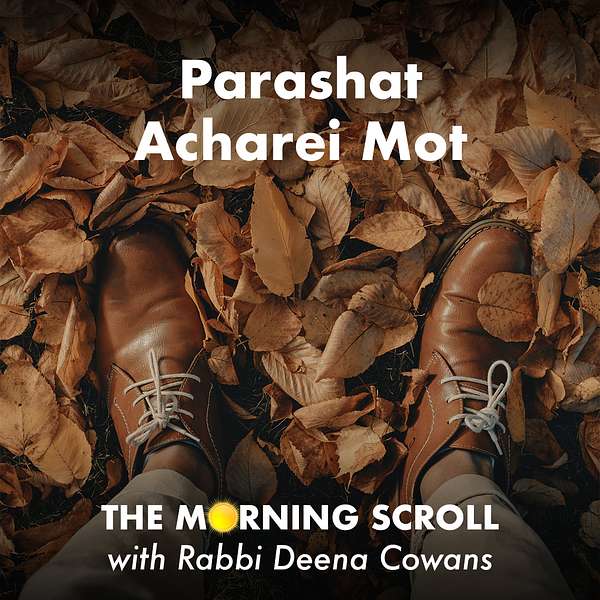
The Morning Scroll
The Morning Scroll
Parashat Acharei Mot, April 27th
Use Left/Right to seek, Home/End to jump to start or end. Hold shift to jump forward or backward.
"If thy goal / is afflicting thy soul / thou shalt not be picking no leather insole."
So goes the ancient saying. At least, it must be ancient — everything in our tradition is ancient, right? Wrong.
Today's episode is sponsored by Broadway In Chicago. Tickets are available now to Fiddler on the Roof at the Cadillac Palace Theatre, from May 17th - 22nd. Use Mishkan's special offer code ROOF45 for $45 Middle Balcony tickets.
Produced by Mishkan Chicago. Music composed, produced, and performed by Kalman Strauss. See our upcoming Shabbat services and programs here, and follow us on Instagram and like us on Facebook for more updates. Check out Shabbat Replay on Contact Chai for more from Rabbi Deena.
Transcript
Welcome to The Morning Scroll! I'm Rabbi Deena Cowans from Mishkan Chicago and you're listening to what will be a quick dive into this week's parsha. If you’ve been meaning to brush up on your Jewish literacy, or you’re looking for some inspiration, you’ve come to the right place. This week, we read Parashat Acharei Mot, “after the death”, which picks our story (slash law book) up after the death of Aaron’s older sons. We’ll start with a brief recap:
Only one person can enter the Holy of Holies, the innermost chamber, once a year, and that person is the High Priest on Yom Kippur. To do so, he needs special clothing and ointments, and must enter in a cloud of burning incense. On Yom Kippur, he goes in, atones for the sins of all the Israelites, and then does a ceremony where he marks one goat for slaughter and one to be sent to Azazel. The Torah concludes this little Yom Kippur manual by telling us to observe the day as a day of atonement and to afflict our souls. Getting back to our regularly scheduled sacrificial laws, we learn not to offer sacrifices anywhere other than the Temple, not to consume any blood, and not to follow the ways of the Egyptians or Canaanites. We also get a list of forbidden sexual relationships, and are warned that the punishment for any of these is expulsion from the land.
This parsha is a great example of how the rabbis of the Talmudic era went from a mention of something in the Torah into a fully developed holiday with all sorts of laws and practices. In this parsha, we get some verses about the ritual, and the cryptic command “v’initem et nafshoteichem”- you shall afflict your souls. Out of this, the rabbis of the Talmud have an entire chapter worth of discussion about what this commandment means, coming to the conclusion that there are five categories of “affliction” that we should observe on YK: no eating, drinking, having sex, wearing leather shoes and wearing ointments. From these five categories, the rabbis go on to talk about exceptions to these rules, what constitutes eating, why they hold these five categories as the ones to observe, and so much more. It’s sort of banal in its details, but I love it as a paradigm for the way we observe Judaism today: we see something in the Torah, the rabbis of the Talmud expand on it, and we get to experience the full historical development of the holiday- we no longer have a high priest who does the full ritual for us in special clothes, like the Torah describes, but we do still have a structure for atoning on the day the Torah commands it, and we do still follow the instructions to afflict ourselves.
It’s moments like these that help us connect to the laws in the Torah, and also to remember that Judaism has been changing and evolving throughout our entire history. We practice an ancient religion, but that does not mean that every practice is ancient. The rabbis built a post-Temple religion that was deliberately flexible and personal, so that no matter where we live- or when we live- we can remain connected to tradition in ways that feel authentic.
This week, I want to offer a blessing to these rabbis, living in the centuries after the destruction of the world as they knew it, who said, “This tradition is still valuable to me and I want to figure out how to live with it… and also make it work for the world I live in”, and whose efforts formed the basis of the Judaism we live today. And I want to offer each of you a blessing for continuing this spirit- for showing up to listen to a podcast in the spirit of “this tradition is still valuable, let me find ways to engage with it in a modern way.”